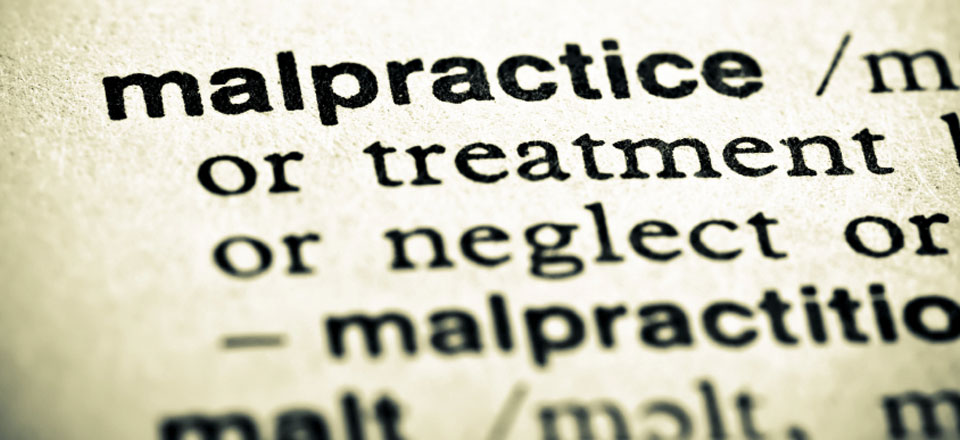Medical negligence is a negligent act or omission by a health care provider in which care provided deviates from accepted standards of practice in the medical community and causes injury to the patient. Standards and regulations for medical malpractice ensure that each and every patient will receive a reasonable standard of care regardless of their age, sex, or race. Medical professionals are required to maintain professional liability insurance to offset the risk and costs of lawsuits based on medical malpractice.
Problems related to medical negligence are widespread
In a recent study by the Harvard School of Public Health, Health Policy and Managment, entitled Accuracy of the Medical Malpractice System: Relationship Between Claims, Errors, and Outcomes of Litigation (2005) the researchers concluded that virtually all claims (97%) involved identifiable adverse outcomes, and most involved serious injury (55%) or death (26%). In 63% of claims, the adverse outcomes were due to error. Reviewers judged the error determination to be a close call in 24% of claims. Plaintiffs received compensation in 57% of claims. The researchers concluded that the impact of frivolous lawsuits may be overstated by physicians and other health care providers.
The Doctors Company, a large physician-owned medical malpractice insurance company, conducted a study of closed or settled claims to determine what percentage of claims were due to system errors. Looking at claims from 2004 to 2006, the researchers found that system errors contributed to 30 percent of settled claims. The most common problems involved medication-related errors (32 percent), communications errors (27 percent), healthcare associated infections (18 percent), medical records errors (13 percent) and identification errors or wrong site surgery (5 percent).
So why does this problem exist? The problem has multiple sources. For example:
In the hospital, residents are required to work excessive hours without adequate supervision. It is estimated that their longest period without sleep during their first year of residency was an average of 37.6 hours, and during a typical work week, they worked an average of 56.9 total hours in on-call shifts in addition to their normal working hours.
A recent survey of doctors and other adults released in the New England Journal of Medicine found that more than a third of the doctors said they or their family members had experienced medical errors, most leading to serious health consequences. The cost to society in terms of disability and health care costs, lost income, lost household production and the personal costs of care are estimated to be between $17 billion and $29 billion. In contrast, the medical liability system costs $6.7 billion annually, about what is spent on dog food each year.
As a result of studies such as the ones identified above, increasingly, hospitals areadopting policies that require them to forgo charges for treatment that involves preventable serious medical errors, also known as “never events.” In its 2008 Hospital Professional Liability and Physician Benchmark Analysis, insurance broker Aon said that “never events” account for one out of six medical malpractice liability claims. As of October 1, 2008, Medicare will no longer pay hospitals for procedures that involve eight types of serious medical errors including operating on the wrong person or wrong site. Vermont’s hospital association said that there should be no payment for eight types of errors. Hospitals in Minnesota and Massachusetts also have adopted never-event policies. Some health insurers are following Medicare’s lead.
It is important to hold health care professionals responsible for their preventable mistakes. Doctors do not police themselves. According to data from the National Practitioner Data Bank, which records all claims paid against physicians, just 5.1 percent of doctors account for 54.2 percent of the malpractice payouts, Of the 35,000 doctors who have had two or more malpractice payouts since 1990, only 7.6 percent of them have been disciplined. And only 13 percent of doctors with five medical malpractice payouts have been disciplined.
Most Recent Medical Malpractice News
Ex-FDA Official Testifies Xarelto Warnings Were Inadequate in Phila Xarelto Bleeding Trial
Testimony by former FDA commissioner David Kessler favored the plaintiff in a Philadelphia state court Xarelto trial that commenced November 6, 2017. On November 14, Kessler opined that the warning labels for the blood thinner [...]
Feldman & Pinto Begin Trial in Xarelto Bleeding Lawsuit
Feldman & Pinto’s personal injury lawyers co-represent plaintiffs in a Xarelto mass tort trial that commenced in Philadelphia state court on November 6, 2017. Xarelto is a dangerous anticoagulant (blood thinner), manufactured by Bayer and marketed [...]
Watchman Stroke Devices Can Cause Serious Injuries
NOTE: Feldman & Pinto no longer handles cases related to injuries caused by Watchman devices. Studies conducted before and after FDA approval of Boston Scientific's anti-stroke device show that Watchman stroke devices can cause serious [...]
Researchers Discover Possible Causes of IVC Filter Breakage
Research conducted in 2016 has revealed possible causes of IVC Filter breakage. Surgeons insert IVC Filters (small metal medical devices) in a vein called the inferior vena cava to prevent pulmonary embolisms (life-threatening blood clots [...]
Ethicon Recalls Dangerous Ethicon Physiomesh™ Flexible Composite Hernia Mesh
Ethicon / Johnson & Johnson issued an urgent field safety notice in 2016, advising of a worldwide recall of its Ethicon Physiomesh™ Flexible Composite Mesh. Ethicon Physiomesh™ Flexible Composite Mesh is a medical device employed [...]
Court Rejects J&J’s Request to Move Invokana Lawsuit out of PA Court
On November 7, 2016, Johnson & Johnson (J&J), the maker of the diabetes drug, Invokana, lost a motion to have an Invokana lawsuit moved from Pennsylvania state court to another jurisdiction. A number of Invokana [...]






